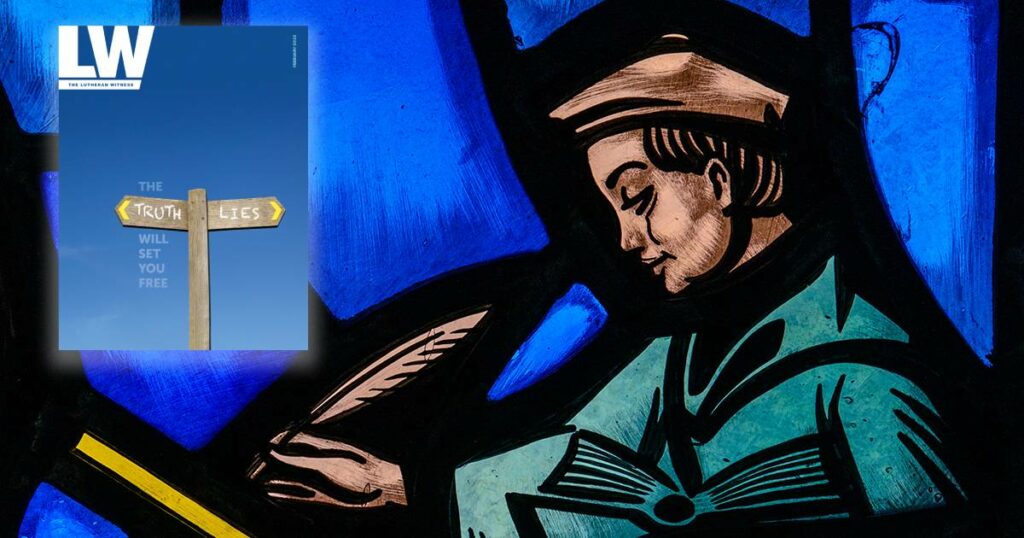The October 2025 issue of The Lutheran Witness provided definitions and explanations of nine different words we use often as Lutherans — and unpacked how other denominations use those terms differently. We are sharing several of these online throughout the month of October.
Definition:
To be saved is to receive God’s act of setting Christians free from bondage to sin, death and the devil; declaring them righteous on account of the work of Christ; and giving them eternal life with Him in heaven.
Lutherans Confess:
As Lutherans, we are familiar with the biblical truth that we are saved by grace alone, through faith alone, contributing no work or merit of our own (Eph. 2:8–9). This issue has already explored what “grace” (p. 10–11) and “faith” (p. 8–9) mean. But what, exactly, does it mean to be “saved”?
This issue has already explored what “grace” (p. 10–11) and “faith” (p. 8–9) mean. But what, exactly, does it mean to be “saved”? To start, let’s consider what we need to be saved from: our sin, and the death that sin has earned us (Rom. 6:23). Mankind was created perfect, for perfect and eternal communion with God and with one another. But since Adam and Eve’s fall, sin has been passed down to each of us — and each one of us has added our own many transgressions to the heap (Rom. 3:23). We are shackled, bound to sin — to the eternal consequences of that sin and to the present consequences of that sin in our lives now. Our sin separates us from God and one another, and from the people we were created to be.
Unable to free ourselves, we need someone to save us from this present and eternal peril. Thanks be to God, although “the wages of sin is death,” He has saved us purely as a gracious gift: “the free gift of God is eternal life in Christ Jesus our Lord” (Rom. 6:23).
From first to last, this salvation is the work of God, not man. Christbecame man, that He might live underthe Law (Gal. 4:4) and keep its demands perfectly, satisfying God’s demand for holiness and moral perfection (1 Peter 1:15–16; Matt. 5:48). As true God, Christ also took upon Himself the sins of the world, and by His death on the cross made a full payment for our sins (Gal. 3:13; Heb. 9:12, 26; 10:12). By this payment for our sins, Christ has saved us from sin and its eternal punishment. We are saved through faith in this work of Christ alone, and not by works of the law (Rom. 1:17; 3:21–22; Gal. 3:10–11), because fallen human beings are incapable of recovering the righteousness God wants by their own efforts (Rom. 3:20; AC II 1; AC IV 1–2; AC XIX; Ap II 3; Ap IV 27, 40).
Nor does this salvation have to do only with eternity — Christ’s salvation is also for us in the here and now. We are baptized into the death and resurrection of Christ so that the new person in Christ is no longer a slave to sin (Rom. 6:3–6). This does not mean that the Christian is without sin in this life. Instead, we are simultaneously saints (declared righteous on account of Christ) and sinners (in our fallen flesh), so that we still struggle to obey God’s will perfectly (Rom. 7:15–23). When God looks at us, however, He sees the new person in Christ, and this is the son He adopts (Gal. 4:57).
Though Satan still accuses us on account of our sin, we have an advocate with the Father (1 John 2:1) who finds us innocent. We are declared righteous on account of the righteousness of Christ, given by grace, received through faith. Since Christ has given us everything, no one can condemn us (Rom. 8:31–39). We can be secure in our salvation, because it is from first to last the work of God: “It is God who justifies” (Rom. 8:33).
While we still suffer tribulations in this vale of tears, they are ultimately insignificant in comparison to the “weight of glory” God has prepared us for (2 Cor. 4:16–18). God did not send His Son into the world to condemn it, but so that we may be saved for eternal life with Him (John 3:16–17). This is an abundant life (John 10:10), where we will live as perfected saints in the company of God forever (Eph. 1:18; 2:19–20), with no more sorrow, death or pain (Rev. 21:4).
Unpacking Other Definitions:
- Cooperation: For Roman Catholics, the term “saved” refers to human reconciliation with God leading to eternal life in heaven with Him. However, for Catholics, this salvation — while initiated by God — comes about by means of our cooperation. Because of this, Catholic theologians often downplay penal substitutionary atonement, or the teaching that we are saved by Christ’s taking on the penalty for our sin. Instead, they prefer to focus on the transformation going on within the life and soul of the Christian here on earth as that which reconciles us to God and leads to eternal life. Thus, being “saved” for Catholics does not refer to an act entirely of God, completed on the cross, but to God’s infusion of grace into the human being, with which, by their cooperation, they can be re-formed to be fit for heaven and eternal life with God.
- Double predestination: Calvinist theology upholds substitutionary atonement, using the term “saved” to refer to the eternal life that has been won for Christians by Christ’s sacrifice on the cross. However, Calvinists believe in double predestination, that God has elected each human either to election or to damnation, and thus that Christ’s atonement is limited: that He died only for those whom God has elected to save. Thus, they teach, those who are truly “saved” will always be saved — they cannot reject God — and those who are not saved can never be so. According to this theology, even some in the church who believe they have faith in Christ may actually not be saved, as they may not truly be one of God’s elect. Scripture, however, teaches that those who are saved are predestined (Eph. 1:5, 11), and that Christ’s atoning sacrifice is sufficient for all, but may be rejected (Acts 7:51).
- Decision theology: Many Evangelicals use the term “saved” to refer to a state of being begun by man’s free decision to accept God’s offer of salvation (sometimes known as “decision theology”). This means that we are not saved by grace alone, through faith alone, in Christ alone, but contribute something to our salvation. However, Scripture teaches that fallen man is “dead in [his] trespasses” (Eph. 2:1), a slave of sin (John 8:34; Rom. 6:16–17), and unable to do anything to please God (Rom. 8:7–8). So, we cannot make a choice for God. Rather, our salvation is entirely the result of the Holy Spirit working on us to create faith in Christ (Rom. 8:9, 14–15).
From Scripture:
“For by grace you have been saved through faith. And this is not your own doing; it is the gift of God, not a result of works, so that no one may boast” (Eph. 2:8–9).
From Our Confessions:
“The Gospel … teaches that God’s Son, our Lord Christ, has taken upon Himself and borne the Law’s curse and has atoned and paid for all our sins. Through Him alone we again enter into favor with God, receive forgiveness of sins through faith and are delivered from death and all the punishment of sins, and are eternally saved” (FC SD V 20).





